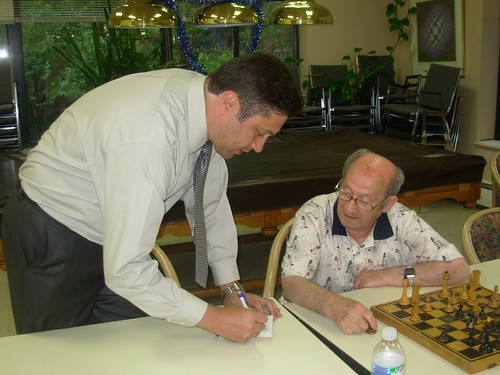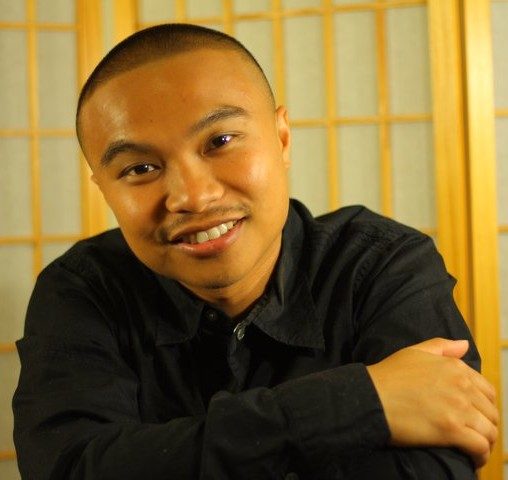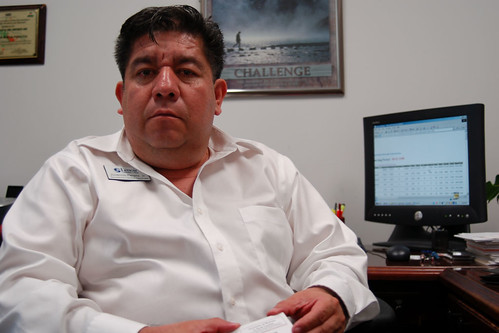This article was written by Ari Kagan who is in Minnesota to cover the Republican National Convention under a project sponsored by Feet in Two Worlds and the New York Community Media Alliance.
Dr. Solomon Bayevsky, an 85-years-old resident of Menorah Plaza Apartments in St. Louis Park, Minnesota, book writer and Persian culture scholar, knows a few things about war. He was just 19 years old, when he was badly injured during the fierce fighting against the Nazis at Stalingrad in 1943. “We don’t need more wars,” said the immigrant from Mogilev, Belarus. “With John McCain America will start a new war with Iran, and maybe even with China (over Taiwan) or Russia.” Bayevsky, who lost the use of his right arm in the war, added, “we will stay in Iraq much longer than we need. I will vote for Barack Obama because he will finish the Iraq war, will use more tough diplomacy in other conflicts, and because he is young, smart and energetic. I also like the Democratic approach toward immigrants and low-income people.”
Listen to an interview with Dr. Solomon Beyevsky by Feet in Two Worlds executive producer John Rudolph.
[audio:http://www.xrew.com/joceimgs/FI2W/fi2w_rnc_solomon.mp3]
Bayevsky’s opinion is not entirely shared by his neighbors, many of them Russian Jewish immigrants who live in this quiet retirement home in a suburb of Minneapolis. Some praised McCain and expressed reservations about Obama’s message of change. But everybody here is ready to vote on September 4 to choose the next president. Most Russian seniors in St. Louis Park receive their information about presidential politics either from Russian-language TV and newspapers or from their children who tend to vote for Republicans.
Listen to an interview with Leonid Kerbel. Mr. Kerbel, 75, immigrated to the US in 1994, following the collapse of the Soviet Union. He was a tennis coach in the USSR, and still stays in shape by playing tennis. Here he explains to John Rudolph why he plans to vote for John McCain.
[audio:http://www.xrew.com/joceimgs/FI2W/fi2w_rnc_leonid.mp3]

Ari Kagan (left) interviews a resident of the Menorah Plaza Apartments in St. Louis Park, Minnesota about the 2008 presidential election.
My visit to the local Russian community was at the end of the first weird day of the Republican National Convention in Saint Paul. The most visible and noisy event of the day was not the convention or appearances by Laura Bush and Cindy McCain who urged delegates to donate money to the Gustav Hurricane relief fund. Instead the biggest media attraction in Minnesota was an anti-war march near the State Capitol. While the main part of this rally (about 8,000 people) was peaceful and predictable, one group of violent self-proclaimed anarchists (about 200 people) behaved and looked like underground terrorists. These young marchers, in dark clothing, and with bandannas over their faces, smashed the windows of a Macy’s department store, slashed the tires of a police car, tried to block the Republican delegates’ buses, and threw various objects at police. Some of them held signs like “Thank God for Gustav,” “Fag McCain,” and “God hates Palin”.
I was pleasantly surprised to see how local police exercised the necessary restraint. Hundreds of cops, sweltering in heavy riot gear on a very hot day, protected delegates and streets from some of the craziest protesters. As a Russian-speaking Jew, who immigrated to America in search for freedom and capitalism, I shook my head when I saw some of the more peaceful marchers with anti-Israel, anti-capitalism and anti-American placards. I am no fan of George W. Bush or his war policies, but I don’t think that signs like “Free Palestine: support the right of return” or “Stop American aggression and idiocy!” were effective in terms of spreading the anti-war message. But we have freedom of speech, so even some radical views could be heard here. That is the beauty of America.
Ari Kagan is Senior Editor for Vecherniy New York, a Russian-language newspaper, and host of the weekly TV show “Here in America” on RTN – the Russian Television Network of America.








